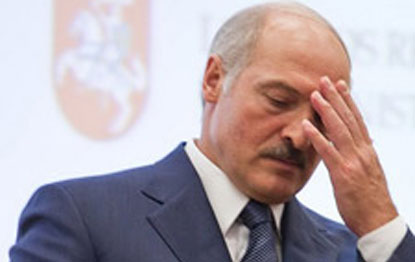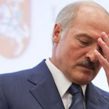
Belarus: Economic Woes and the Fate of Gloomy Predictions
Publication: Eurasia Daily Monitor Volume: 13 Issue: 52
By:

In January 2016, Belarus’s gross domestic product (GDP) was 4.3 percent lower than in January 2015 (Infofocus, February 2016). Since refined oil accounts for one-third of Belarusian exports, the steep decline in oil prices is the major factor explaining this shrinking GDP. It works directly, through lowered prices of refined oil products, and indirectly, through curtailing the buying power of the Russian market, where Belarus routinely disposes of most of its manufacturing exports.
The ongoing economic decline has intensified the domestic debate about Belarus’s economic policy (see EDM, February 3). In the past, suggestions of structural reforms emanated mainly from the International Monetary Fund (IMF). But today, identical suggestions come from the government and from President Alyaksandr Lukashenka’s advisor Kirill Rudyi (Naviny.by, March 2), who openly opposes the principles of current economic policy (i.e., limited privatization, selected price controls, subsidizing state-run enterprises and utilities, etc.) and yet retains his position. Lukashenka’s statement that “the suggestions of the government regarding blanket privatization cannot be accepted” (Tut.by, February 22) is an indication of the sheer intensity of the debate among the ruling elite.
Perhaps one should not overdramatize the significance of those debates. On the one hand, as Oscar Wilde used to say, “the only way to get rid of a temptation is to yield to it,” which is what Russians did in the early 1990s with the large-scale privatization program that led to discontent and a renewed faith in state paternalism. In Belarus, however, similar developments were thwarted by Lukashenka’s electoral triumph in 1994. So today, the pent-up desire to follow neoliberal prescriptions in Belarus resembles a longing for a forbidden fruit (Tut.by, February 29). On the other hand, Belarus has arguably led the world in being the most frequent target of accusations of impending catastrophe to its economy. But so far, the country has been kept afloat thanks to foreign loans and by selling potash—the only natural resource whose production-and-processing cycle has remained entirely in the hands of the Belarusian state.
On March 10, in Washington, the very same “catastrophic” language was once again uttered, this time by Andrei Sannikov (Naviny.by, March 12), a 2010 presidential hopeful with no political prospects left back home. According to a December 2015 national survey by IISEPS, the most reputable Belarusian pollster funded by the West, the domestic opposition enjoys the trust of 12.6 percent of Belarusians (Infofocus, February 2016). Even so, the opposition is now inundated by internecine struggles for visibility and leadership. The major fight is between Nikolai Statkevich, a 2010 presidential hopeful jailed from December 19, 2010, to August 22, 2016, and Anatoly Lebedko, who has headed the United Civic Party for about as long as Lukashenka has been president of Belarus (Svaboda.org, March 2). Both leaders are trying their best to ride the wave of discontent expressed by petty entrepreneurs and shuttle traders who have been demonstrating in downtown Minsk for several weeks. These groups are protesting the so-called Decree No. 222, signed by Lukashenka in 2014, according to which every industrial item (like clothes and footwear) sold at flea-market-like outlets must be accompanied by a certificate identifying the origin of this product and its technical characteristics. Such certificates are supposed to be obtained from wholesale distributors in, say, Russia and elsewhere; but meeting this demand under current conditions boosts transaction costs for the merchants, without actually ensuring improved quality. So far, the rallies of the entrepreneurs mustered several dozen people and were not dispersed by police. In some cases, the police drew up reports for misdemeanor offenses (as the rallies have been conducted without permits), but nobody has been arrested, to date. With the passage of time, more and more political activists and fewer entrepreneurs have been participating (Tut.by, March 5); opposition leaders are helping with loudspeakers and oratory skills. However, the problem, as the veteran opposition columnist Alexander Klaskovsky puts it, is that “there are too many chiefs and not enough Indians,” underscoring a striking deficit of people willing to do tedious groundwork—seemingly the eternal problem of the Belarusian opposition (Naviny.by, March 3).
In the meantime, some silver linings can be observed, despite the generally dismal economic front. For one thing, the authorities are sustaining their efforts to propel ties with the West to a new level, taking advantage of the lifting of Belarusian sanctions by the European Union. And testifying to the quality of Belarusian high-tech firms, Facebook recently acquired Masquerade Technologies, a young start-up whose Snapchat-like silly selfie-altering tool picked up 15 million users in just three months. On March 9, the Minsk-based Masquerade announced the sale, saying on its website that the company was excited to bring its virtual effects software to Facebook’s 1.6 billion users. But Masquerade will independently operate its MSQRD app, which connects with several social media apps (Tut.by, March 9). This is the fifth acquisition of a Belarusian high-tech firm by a notable foreign giant, the previous acquisitions being those of Viaden Media by Playtech; Viber by Rakuten; Maps.me by Mail.ru; and Apalon by InterActiveCorp (Tut.by, March 10).
Several major developments also reflect a growing international involvement by Minsk. Thus, the head of the EU delegation to Belarus, Andrea Victorin, announced that the European Union would increase its economic modernization aid to Minsk (Tut.by, March 9). Moreover, an international conference on capital punishment took place in Minsk and its major participant, Stavros Lambrinidis, the EU’s Special Representative for Human Rights, was received by President Lukashenka (Naviny.by, March 9). In addition, Hans-Gert Poettering, the head of the Konrad Adenauer Foundation, visited Minsk and discussed the possibility of reopening its Minsk office with Foreign Minister Vladimir Makei (Tut.by, March 9). Also, the Israeli government reversed its earlier decision to close its embassy in Minsk (Tut.by, March 10). Perhaps most importantly, the negotiations between Minsk and the IMF about a new loan program will be resumed in April (Tut.by, March 3).
By all accounts, then, life goes on in Belarus. And perhaps, the catastrophic scenarios regularly being applied to this Eastern European country might finally be put to rest, as they temporarily were on so many occasions since the mid-1990s.




